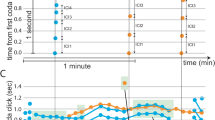Abstract
ADULT members of the phylum Nematomorpha, residing in aquatic habitats, lay their eggs within long strings commonly referred to as ‘egg-strings’. In the nematomorphs this egg-string is considered a secretory product of the antrum (a common chamber situated between the uteri and the cloaca and lined with a layer of glandular epithelium)1. Whereas the egg-laying habits of the nematomorphs are fairly well described, those of marine nemas are practically unknown. Hyman1, in the Nematoda section of her invertebrate compilation, states that some marine nemas lay their eggs in an adhesive mass. Recently, the opportunity to elaborate on this observation was presented while I was studying marine nemas at the Woods Hole Oceanographic Institution, Woods Hole, Massachusetts.
This is a preview of subscription content, access via your institution
Access options
Subscribe to this journal
Receive 51 print issues and online access
$199.00 per year
only $3.90 per issue
Buy this article
- Purchase on Springer Link
- Instant access to full article PDF
Prices may be subject to local taxes which are calculated during checkout
Similar content being viewed by others
References
Hyman, L., “The Invertebrates”, 3 (McGraw-Hill, New York, 1951).
Author information
Authors and Affiliations
Rights and permissions
About this article
Cite this article
HOPPER, B. Occurrence of an Egg-String in Enoplus communis Bastian, 1865 (Nematoda: Enoplidae). Nature 189, 331–332 (1961). https://doi.org/10.1038/189331a0
Issue Date:
DOI: https://doi.org/10.1038/189331a0
Comments
By submitting a comment you agree to abide by our Terms and Community Guidelines. If you find something abusive or that does not comply with our terms or guidelines please flag it as inappropriate.



